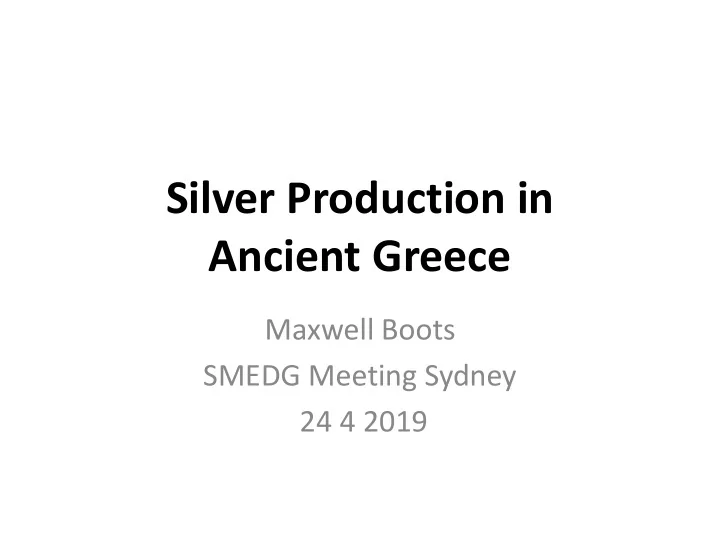

Silver Production in Ancient Greece Maxwell Boots SMEDG Meeting Sydney 24 4 2019
Location of Laurion and the Mines
Early Greek Owl Coins
Figure 10. The ore floatation plant of the Greek company at the beginning of 20th Century. With a 3350 m² surface area it was then one of the biggest in the world. Unfortunately, only a small part of it was saved. (Image from the book “Historical and technological equipment in Greece”) Figure 11. The French companies plant in 2000, well after production ceased.
Examples of concentrating tables which have survived about 2500 years
Another concentrating table
Example of water storage cistern that has survived
Another cistern, this time rectangular
Sketch showing smelting of ores to obtain lead
Sketch showing retorting of lead to produce silver
A Trireme
View of the Parthenon at the top of the Acropolis
Another view of the Parthenon at the top of the Acropolis
The Erechtheion (a Temple to both Athena and Poseidon) built between 421-406 BCE
A more complete view of the Erechtheion
The Temple of Athena Nike built between 427 and 420 BCE
The other side of Temple of Athena Nike
Propylaea (The Entrance) was built between 437 BCE-431 BCE
Artist impression of original structure of the Propylaea
The Temple of Hephaestus with its Doric columns is in the Agora of Athens and was built c 450 BCE
Cape Sounian and the Temple of Poseidon (God of Sea for Ancient Greeks)
The current Temple of Poseidon at Cape Sounian
A Quote Found in Researching Let us bring crashing down another of those myths: the ancient Greeks were nice folk. Seems they got most of the money to support their poetry, philosophy, development of “democracy,” and sundry other habits from mining. It appears that ancient Greece was a society founded on mining, and the money from mining supported a small upper class that had time (and slaves) to sit around thinking, talking, writing, and leaving a legacy to impress future generations. Certainly, I like many others, was taught of the glories of the Greeks in literature, theatre, and learning. Nobody ever told me this was made possible by large-scale mining.
Recommend
More recommend